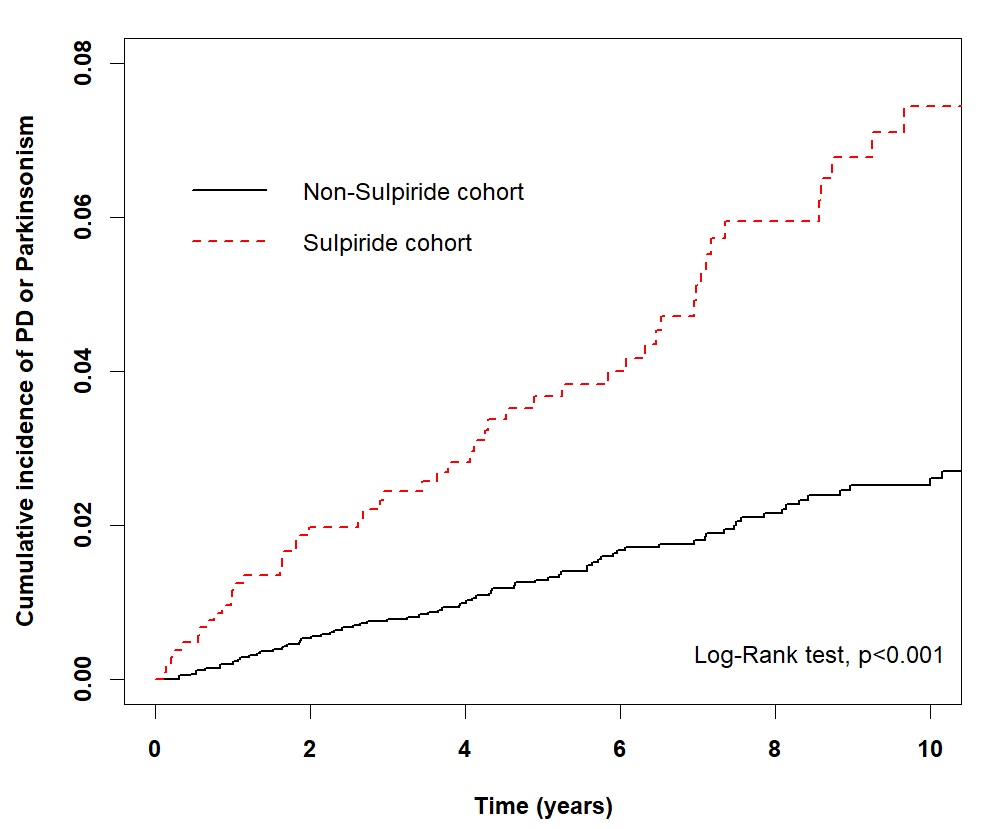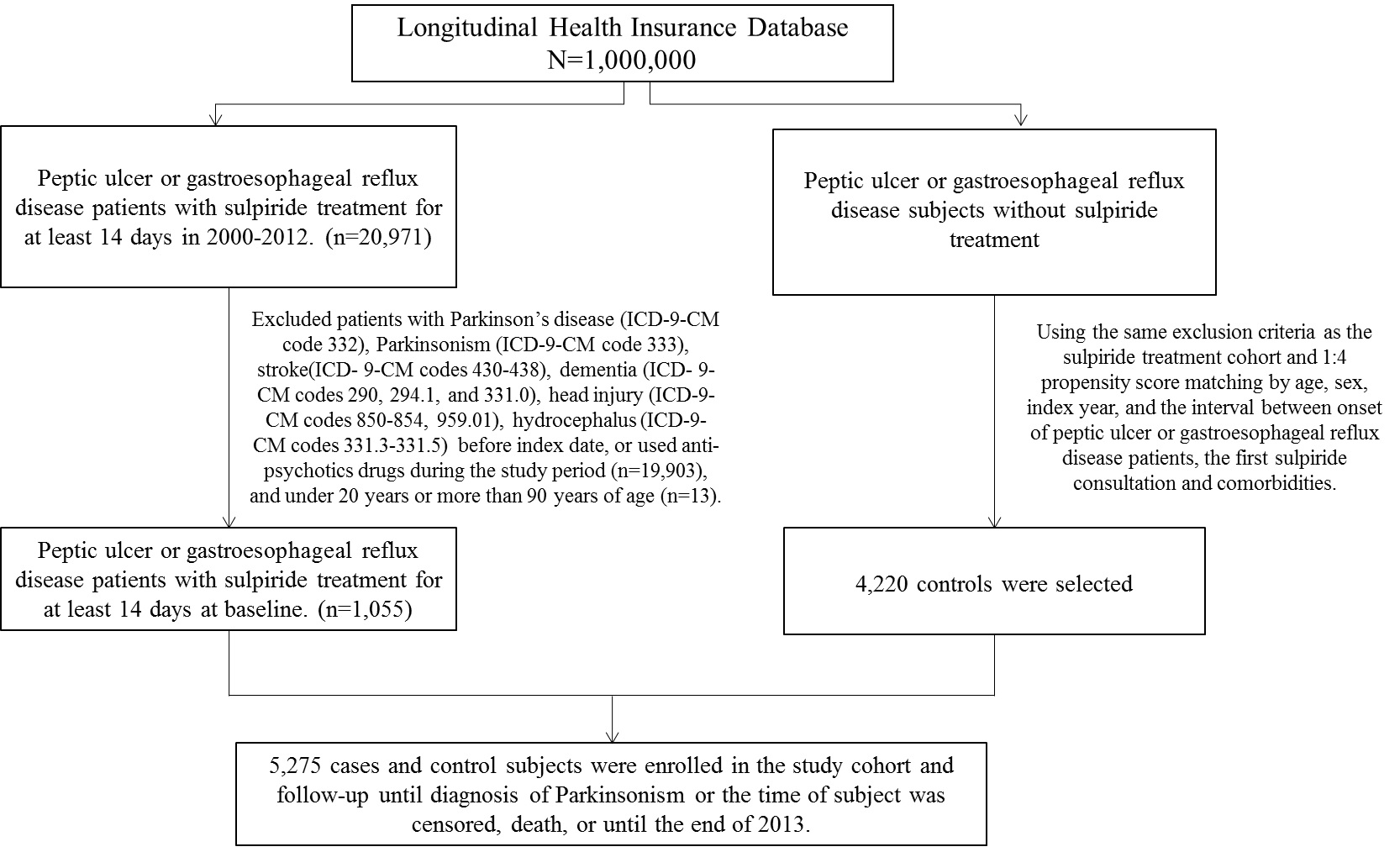Category: Epidemiology
Objective: This study aimed to investigate the risk factors and the cumulative daily dose associated with sulpiride-induced parkinsonism (SIP) in peptic ulcer disease (PUD) and gastroesophageal reflux disease (GURD) patients.
Background: Sulpiride is a highly selective dopamine D2 receptor antagonist and is commonly used in psychiatric disorders, Tourette syndrome, PUD, and GERD. However, sulpiride has been recognized as a potential cause of drug-induced parkinsonism (DIP) for a long time. However, to our knowledge, there has been no population-based subgroup analysis for sulpiride-SIP in PUD and GERD patients.
Method: Data were obtained from the Taiwan’s National Health Insurance Research Database. The study enrolled 5,275 PUD or GERD patients, of whom were divided into two groups, based on their exposure (1,055 cases) or non-exposure (4,220 cases) to sulpiride.
Results: During the study period (2000–2012), the incidence rate of parkinsonism was 26.15 and 76.22 per 10,000 person-years in the control and sulpiride-treated groups, respectively. For patients with at least 14 days of prescription for sulpiride, the adjusted hazard ratio (aHR) was 2.89, 95% confidence interval (CI): 2.04-4.11. Patients with age more than 65 years (aHR = 4.99, 95% CI = 2.58-9.65), hypertension (aHR = 2.39, 95% CI = 1.49-3.82), depression (aHR = 2.00, 95% CI = 1.38-2.91), and anxiety (aHR = 1.45, 95% CI = 1.01-2.09) had significant higher risk of developing parkinsonism. An average annual cumulative sulpiride dose > 1,103 mg was accompanied by the greatest risk of SIP; sulpiride use for 9 days is a cut-off point for predicting future SIP.
Conclusion: At the population level, this study showed a complete picture of SIP in PUD or GERD patients. SIP is associated with older age, hypertension, depression or anxiety comorbidities. Physicians should be aware of the neurogenic adverse effects, even when the drug is only used in low-dose or a short duration.
References: 1. Byun JH, Cho H, Kim YJ, Kim JS, Baik JS, Jang S, Ma HI. Trends in the Prevalence of Drug-Induced Parkinsonism in Korea. Yonsei Med J. 2019;60:760-767. 2. Han S, Kim S, Kim H, Shin HW, Na KS, Suh HS. Prevalence and incidence of Parkinson’s disease and drug-induced parkinsonism in Korea. BMC Public Health. 2019;19(1):1328. 3. Mauri MC, Bravin S, Bitetto A, Rudelli R, Invernizzi G. A risk-benefit assessment of sulpiride in the treatment of schizophrenia. Drug Saf. 1996;14:288-298. 4. Savica R, Grossardt BR, Bower JH, Ahlskog JE, Mielke MM, Rocca WA. Incidence and time trends of drug-induced parkinsonism: A 30-year population-based study. Mov Disord. 2017;32:227-234. 5. Shin HW, Chung SJ. Drug-induced parkinsonism. J Clin Neurol 2012;8:15-21.
To cite this abstract in AMA style:
C.Y Wei, M.C Lin, W.M Kung. Sulpiride-induced Parkinsonism in Peptic Ulcer and Gastroesophageal Reflux Disease Patients: A Nationwide Population-Based Study [abstract]. Mov Disord. 2020; 35 (suppl 1). https://www.mdsabstracts.org/abstract/sulpiride-induced-parkinsonism-in-peptic-ulcer-and-gastroesophageal-reflux-disease-patients-a-nationwide-population-based-study/. Accessed April 18, 2025.« Back to MDS Virtual Congress 2020
MDS Abstracts - https://www.mdsabstracts.org/abstract/sulpiride-induced-parkinsonism-in-peptic-ulcer-and-gastroesophageal-reflux-disease-patients-a-nationwide-population-based-study/


